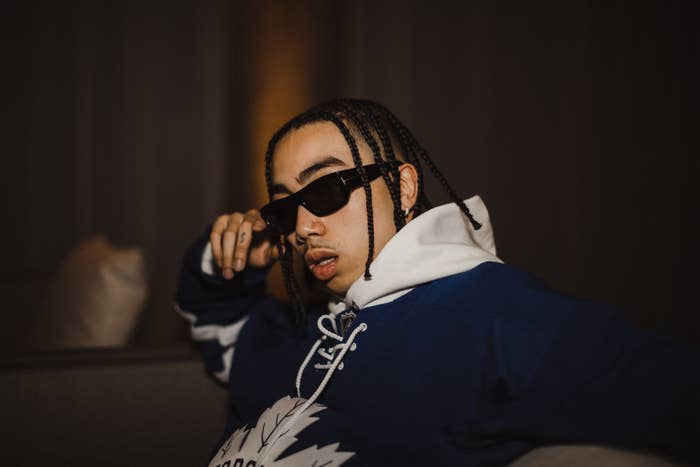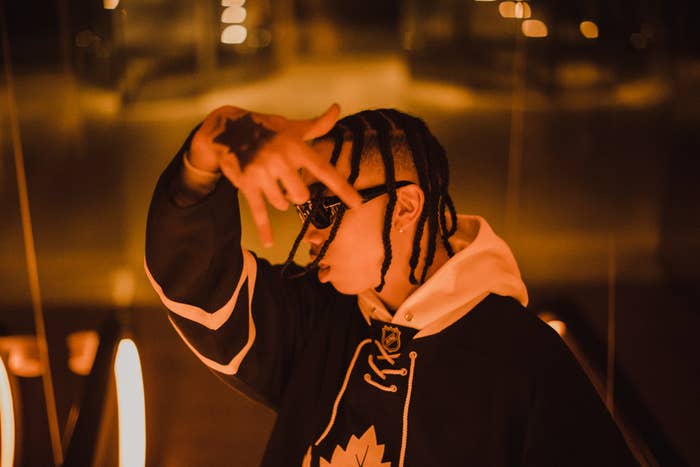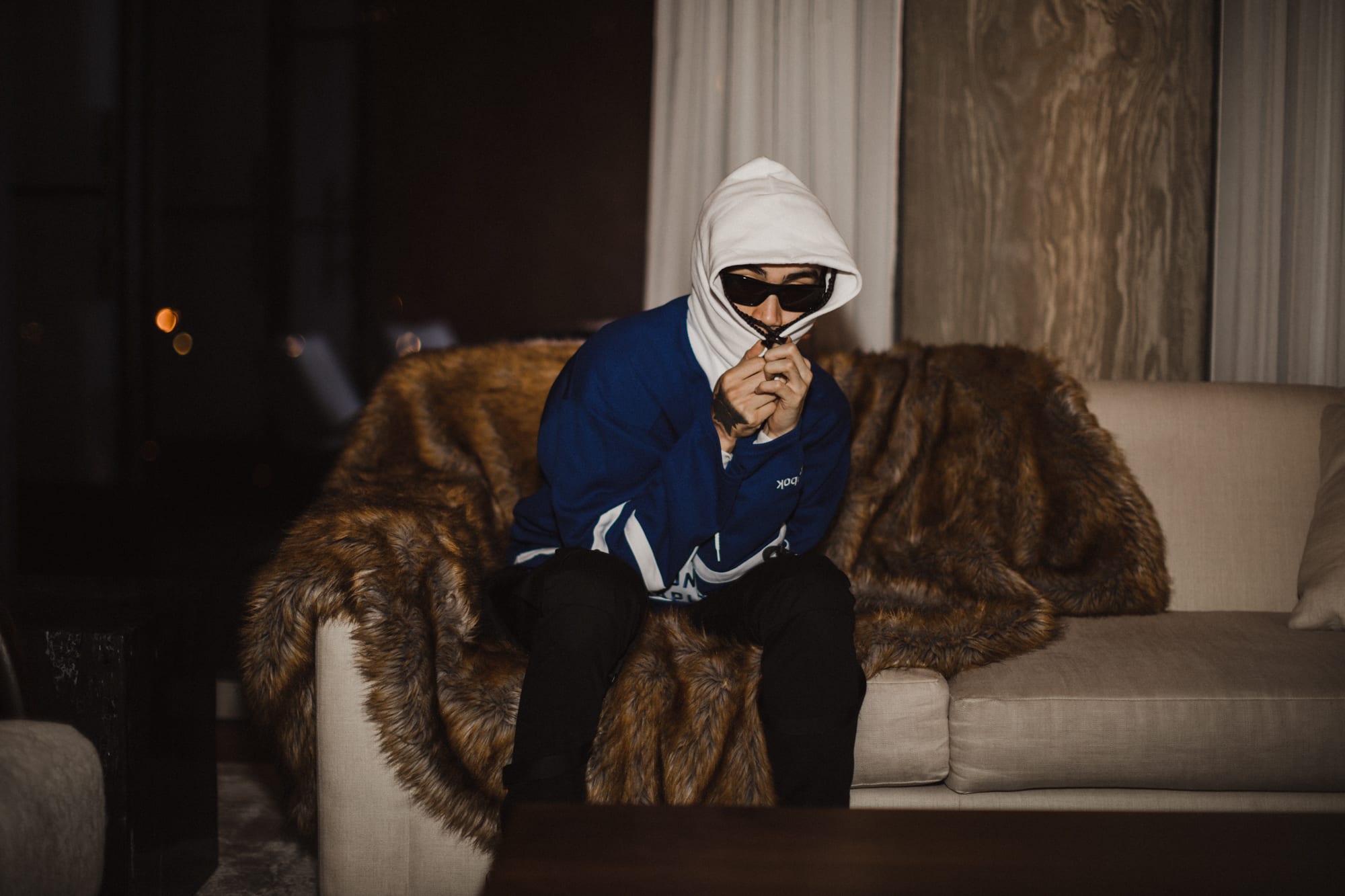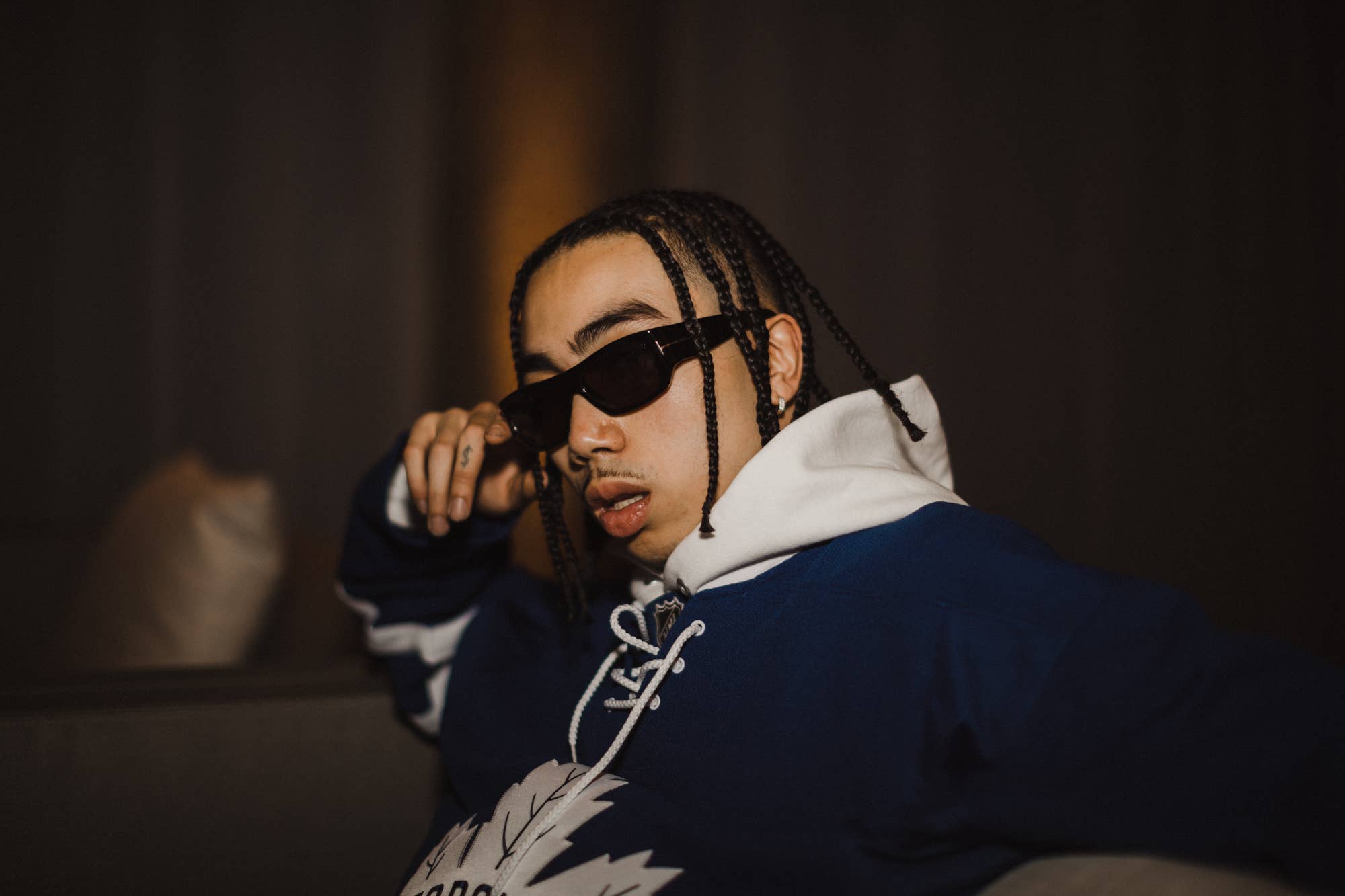
From the moment he burst onto the scene with the inky visuals of his breakout single “Killamonjaro,” Toronto rapper Killy seemed committed to creating a world all his own, equal parts inviting and sinister. His music, which blended raucous energy and end-of-the-world urgency with the woozy soundscapes of his city, was an instant hit, and has racked up millions of streams.
But while his rapid rise mirrors many of the so-called SoundCloud rappers who’ve dominated recent rap discourse, Killy is fixated on building for the long-haul, invoking names like Drake, Travis Scott, and Outkast. It’s fitting that the first words most listeners ever heard him say were, “I can introduce you to this life we live forever.”
Last week, Killy released his debut project, Surrender Your Soul. The project builds on Killy's ability to ride metallic production with slick flows and melodic bars, creating textures akin to steel sharpening steel. The record includes his hit singles “Killamonjaro” and “Distance,” as well as impressive new tracks like the pensive “Fireflies,” the electric “No Sad No Bad,” and “Doomsday.”
When discussing his music, Killy is cognizant of the pitfalls young rappers often face, and projects a purposefulness and clear sense of the direction he wants for his career. “I wanted a real intimate connection with my fans and a real, authentic come up,” he explained. “I could’ve dropped 10 songs like ‘Killamonjaro' at once a year ago, and said, ‘What’s up? I’m here now.’ But I want a legacy, a real legacy.”
On the eve of the Surrender Your Soul release, the 20-year-old MC joined us in New York to discuss his long journey crafting music outside of the public eye, his take on the state of Toronto rap, and how he hopes people will look back on his music in 5,000 years.
Your Canadian tour opens up in Toronto. What’s going to be the signature of a Killy show?
Chaos. Pure chaos, pure energy, that’s all it is.
I read a quote where you talked about how you prefer to “build” a track rather than just rap on it. Could you explain that a little more?
I’ll have the beat, I’ll go in, I’ll mumble throughout the song for a couple tries, and then I channel in on something I like and work on that and just build it up. My songs have layers, sometimes 10 layers of my voice in the same five seconds, but I have to build it to sound good.
“No Sad No Bad” in particular really uses your backing vocals to create a menacing effect.
Yeah, all those high-pitched sounds you hear in the back, that’s all my voice. That’s me telling my engineer, “Let’s hear this pitched up. What would this sound like if we put Auto-tune on this and then pitched it down?” You know, so a lot of the instruments you think you’re hearing on that song in the background are really my voice and we’re just tweaking with it and putting effects to make it sound like an instrument. The flute—the “woo” that you hear, all that shit, that’s all my voice.
How’d you link up with producers on the project like Y2K and Wondagurl?
Wondagurl—we’re both from Toronto, before ever meeting her I was a fan of her beats, she’s a legend. She’s been a legend since she was young. It just happened naturally, I don’t even know. I just met her in the studio one time and we just started working a lot. Y2K I met through Nessly. I worked with him, made “No Sad, No Bad” and I was like, “What the fuck, this was live, we need to do more.” And he ended up working on the project heavy, mixing, adding guitar riffs.
Obviously you’ve worked with Nessly and a few other artists, but there were no features on Surrender Your Soul. Was that deliberate so the project would just be your singular perspective?
It wasn’t deliberate... it wasn’t like, “No features allowed.” I just feel like there’s no one in my life right now that could give me a feature that deserves to really. If Drake came and was like, “Yo, I have a feature,” maybe that would’ve gone on the album. My mentality is that I can do what most of these people are doing. Rapping, having bars, I can do that, you know? If I’m doing a feature either I’m a fan of your music, you’re a legend, or you’re my friend type of thing.
So it would be a Drake, or a Travis Scott or somebody like that.
Yeah, basically. Drake, Travis. Uzi is super sick, I think Uzi’s up there with all of them. But yeah, someone who’s a real sicko, Outkast or something like that. Those are the people I really wanna end up working with, the established legends. I feel like that’s where I stand. That’s where my music stands, not in the perception of other people yet, but eventually. I hold myself to that standard.
What was the process like to select what made it on the final project?
It kinda happened naturally. I probably have—excluding those 10, maybe 90 songs, 100 songs. They kind of just picked themselves. They all were themed, they all were kind of woven together. I think I have cooler songs than some of the songs [on Surrender Your Soul], but as a body of work from one to 11 those are the songs that were best suited for that.

Sometimes people will put out records where the singles really stick out, but you did a good job of blending “Killamonjaro” and “Distance” into the rest of the project.
People say your first album is your best album because you have your whole life to work up towards it, and that’s really what it is. A lot of these songs date back a long time, or I’ve had the idea of them or reused concepts, and finally found a way to package it the way I wanted to. A lot of the concepts that are in these songs I’ve had since I was young and finally just got a good way to translate it properly.
As someone who represents a community that doesn’t always have a huge platform in hip-hop [Killy was raised in a Filipino and Bajan household], how does that factor into the music and how you present yourself?
When you meet someone the first interaction is always sight, so on the surface in this industry you put me next to the people who look like me, and they’re either meme rappers or they have an overseas perspective on hip-hop culture in North America. They either make parody rap or battle rap or they don’t speak English. I didn’t like how instantly, based off appearance, I was thrown into this category of other people, because my music is not like that.
Now, I guess I’ve embraced it more. I just want to be known regardless, I want my music to speak for me, that’s all I want to represent me. You know how Nav came out, or The Weeknd came out and no one knew what they looked like? For a long time I wanted to do that. It just didn’t work out like that because my image was a big reason of why “Killamonjaro” hit. That didn’t work out, but that was my mentality at first.
You've said you were pretty hands on shooting your music videos.
The reason why I came in with such a defined identity is because for years prior, I wasn’t showing the public my grind. I’ve been on the same grind since middle school. I’ve been working for Surrender Your Soul, this project, since middle school, to be honest. Even if I didn’t call it Surrender Your Soul back then, all my work has been going towards this. People see me drop a video and they see me go up that fast, but they don’t see the six, seven years that came before that.
Do you feel like there’s too much of the opposite of that in hip-hop? There’s too many people putting everything they do out there in the world?
The state of the music is fucked, because it’s not music anymore. Music is so disposable, and people are thriving off their hair, or off a meme, or off their beef. It’s rare that someone is going crazy for the music they’re making, in this genre at least, and that’s just something that I want to push. I might be on Instagram Live getting mad ignorant, beefing, but at the end of the day, the spine of this, the motor on this machine is my music that’s pushing it. It’s not anything other than that.
Where does the title Surrender Your Soul come from?
Surrender Your Soul, it kind of named itself really. I had a song called “Surrender,” which is now on YouTube. It’s the intro [for the album]. I recorded it before “Killamonjaro.” I was drunk in a limo, and I did a snippet of it, and the snippet has now 500,000 views on YouTube. And people named it “Surrender Your Soul” instead of “Surrender” because I say the words “surrender your soul” in it.
I don’t know how to explain it, but I can’t remember the time when I was like, “This is called Surrender Your Soul.” I just kind of started calling it that, it just happened. One day, I started referring to my project as Surrender Your Soul and didn’t really say or think too much about it. I guess the people mostly decided for me.
I didn’t even know you had a project coming out for a while. I figured you were going to release a couple more singles.
I could drop two more projects if I wanted to. I have a lot of songs. It’s just about, [sings] "I could introduce you to this life we live forever." I’m very legacy based. I want to live forever. I want people to look back in fifty to 500 to 5,000 years, the same way that you have someone like Socrates who’s still relevant in today’s conversations, or you have philosophers that are still relevant in everyday philosophy courses that really you don’t even know what they looked like they’re so old—2,000 years ago—but they live forever. And that’s what I want to do.

If you pioneer something, if you come up with a concept that has not been explored before, then that’s a legacy. It’s not just dropping tracks.
A lot of people thought I was also an industry plant, a lot of people think that I’m signed and I’m really not. I’m fully independent. I wanted a real intimate connection with my fans and a real, authentic come up. I could’ve dropped 10 [tracks like] “Killamonjaro” at once a year ago, and been like, “What’s up? I’m here now.” But I want a legacy, a real legacy.
You’ve talked in interviews before about meeting with labels and being open to signing with one. What are your feelings on that now?
It’s gotten harder, but it’s gotten a lot easier, too. If anything, I’ve learned a lot about the industry and I don’t know if I want to sign to a label anymore. I’ve gotten this far on my own—well not on my own, with my team—everything we do is in-house. If we’re doing this, why can’t we just keep doing it like this? That’s more of my thought process now, but obviously, I do want to take it to the next level, so whatever the best option for that is, I’ll consider. And if that’s a label, that’s a label. If it’s doing it myself, it’s myself.
I wanted to ask about “Fireflies.” It’s super melodic and low-key. When you were writing it were you thinking, “This is a different side of me that I haven’tshown?”
That’s what I’m saying, people just don’t know. If I wanted, I could drop a five-song EP of just “Fireflies” type of songs, just guitar and singing type shit. I just make music. I just made the song and was like, “This is sick. This would be a sick outro.” It’s still me, it’s just people don’t see me as that yet. Since I have so little out, there’s a lot that people don’t—like with the song “Doomsday,” that one is different as well. They’re used to “Killamonjaro,” “Very Scary,” “No Romance,” the ignorant bangers, so it’s just like, I’m excited to finally have this project out so they can now see that there’s other [dimensions]. As far as “Fireflies” goes, I really like that type of vibe, I have a lot of other songs with the same producer with the same type of style. Now that I have a project out I’m gonna start releasing a lot more music.
What do you think about the state of Toronto hip-hop at the moment?
I think it’s super sick. I think Toronto is slowly becoming a hotspot for hip-hop. Since I’ve been in this and since I’ve been paying attention to the scene in Toronto, I’ve noticed people are now working together more, kind of on an Atlanta vibe where everyone is there to support each other and leaving the street politics out of it. Toronto is called “Screwface City,” that’s a nickname for the city because you’re walking down the street and people are preeing you like they hate you and you don’t even know them. That’s the stigma that comes with the city. But now it’s like, I see a lot of rappers that are from different blocks and they’re all working together. It’s a real cool thing that’s happening for sure.

